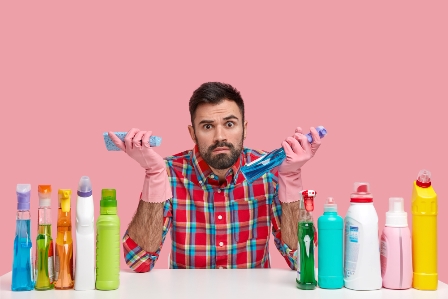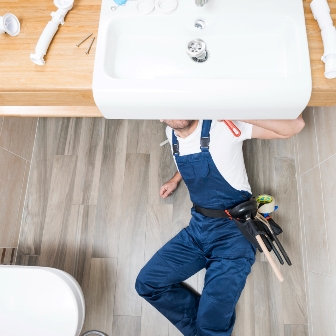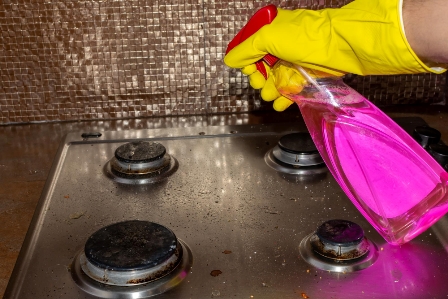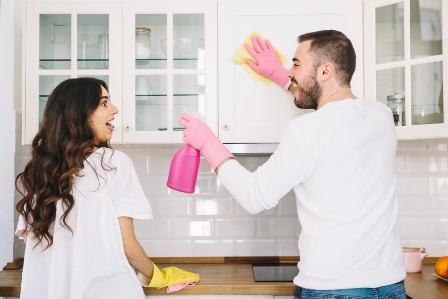In the hustle and bustle of our daily lives, the importance of maintaining a clean living space often takes a back seat. However, the connection between cleanliness and well-being cannot be overstated. A spotless space not only contributes to physical health but also has a profound impact on mental well-being.
The Psychology of a Clean Space
Impact on Mental Health
A clean and organized space can do wonders for mental health. The visual appeal of a tidy environment reduces stress levels and promotes a sense of calm and tranquility. As we navigate through life, having a home that serves as a sanctuary becomes crucial for our overall well-being.
Increased Productivity and Reduced Stress
Studies show that individuals who maintain a clean and organized living space tend to be more productive and less stressed. The act of cleaning itself can be therapeutic, providing a sense of accomplishment and order in an otherwise chaotic world.
Essential Cleaning Supplies
Must-Have Items for Effective Cleaning
To master the art of cleaning, it’s essential to have the right tools at your disposal. High-quality microfiber cloths, multipurpose cleaners, and durable scrub brushes are among the must-have items for effective cleaning.
Environmentally Friendly Alternatives
For those who are environmentally conscious, there are plenty of eco-friendly cleaning alternatives available. From homemade cleaning solutions using vinegar and baking soda to reusable cleaning cloths, making sustainable choices contributes to both a clean home and a clean planet.
Room-by-Room Cleaning Guide
Kitchen: Tips for a Sparkling Culinary Space
The kitchen, often referred to as the heart of the home, requires special attention. Regularly cleaning appliances, countertops, and ensuring a clutter-free space are essential for a sparkling culinary environment.
Living Room: Creating an Inviting and Tidy Atmosphere
In the living room, where relaxation and entertainment take center stage, maintaining an inviting and tidy atmosphere is key. Regular dusting, vacuuming, and organizing contribute to a welcoming space for family and friends.
Bedroom: The Importance of a Clean and Serene Sleep Environment
The bedroom should be a sanctuary for rest and relaxation. Clean bedding, organized closets, and a clutter-free space contribute to a serene sleep environment that promotes overall well-being.
Bathroom: Tackling Germs and Maintaining Hygiene
The bathroom is a breeding ground for germs, requiring meticulous cleaning. Regular disinfection, proper ventilation, and maintaining hygiene practices are essential for a clean and healthy bathroom space.
Pro Tips for Efficient Cleaning
Time-Saving Techniques
In our fast-paced lives, finding efficient cleaning techniques is a game-changer. From multitasking to utilizing smart cleaning tools, incorporating time-saving strategies can make the cleaning process more manageable.
Dealing with Stubborn Stains and Dirt
Stubborn stains and dirt can be a headache. Understanding the nature of the stain and using targeted cleaning agents is crucial. Whether it’s wine on the carpet or grease in the kitchen, knowing how to tackle specific challenges ensures a spotless outcome.
The Art of Decluttering
Benefits of Decluttering
Decluttering goes hand in hand with cleaning and offers numerous benefits. It not only enhances the visual appeal of a space but also reduces stress and promotes a sense of order. Streamlining possessions and eliminating unnecessary items contribute to a more organized and functional living space.
Strategies for Decluttering Various Spaces
Different spaces require different decluttering strategies. Whether it’s tackling a messy closet, organizing kitchen cabinets, or managing kids’ toys, having specific approaches for each area ensures a systematic and effective decluttering process.
Incorporating Cleaning Into Your Routine
Daily, Weekly, and Monthly Cleaning Tasks
Maintaining a spotless space is an ongoing process. Establishing a cleaning routine that includes daily, weekly, and monthly tasks ensures that the cleanliness of your home becomes a habit rather than a daunting task. Consistency is key to achieving and sustaining a clean living space.
Creating a Cleaning Schedule That Works for You
We all have different schedules and lifestyles. Creating a cleaning schedule that aligns with your routine ensures that cleaning becomes a seamless part of your day. Tailor your schedule to fit your needs, making it more manageable and less overwhelming.
Green Cleaning: Eco-Friendly Practices
Using Natural Ingredients for Effective Cleaning
The shift towards environmentally friendly practices extends to cleaning. Natural ingredients like lemon, vinegar, and baking soda can be powerful cleaning agents. Embracing green cleaning not only reduces exposure to harmful chemicals but also contributes to a healthier planet.
Reducing the Environmental Impact of Cleaning
Choosing eco-friendly cleaning products and minimizing waste are essential steps in reducing the environmental impact of cleaning. From opting for reusable cleaning tools to making informed choices about product packaging, small changes collectively make a significant difference.
Common Cleaning Mistakes to Avoid
Overlooking Hidden Areas
One common mistake in cleaning is overlooking hidden areas. Dust and dirt can accumulate in corners, behind furniture, and in neglected spaces. Being thorough in your cleaning routine means addressing these hidden areas to achieve a truly spotless space.
Using the Wrong Cleaning Products
Not all surfaces and materials are created equal, and using the wrong cleaning products can lead to damage. Understanding the compatibility of cleaning agents with different surfaces is crucial to avoid unintentional harm and ensure effective cleaning.
Cleaning for Health: Allergens and Indoor Air Quality
Impact of Cleanliness on Allergies
A clean living space plays a vital role in managing allergies. Regular cleaning helps reduce dust mites, pet dander, and other common allergens. Maintaining a low-allergen environment is especially important for those with allergies or respiratory conditions.
Improving Indoor Air Quality Through Cleaning
Cleaning isn’t just about surfaces; it’s also about the air we breathe. Dust, pollutants, and allergens can affect indoor air quality. Regular cleaning, proper ventilation, and investing in air purifiers contribute to a healthier indoor environment.
The Science of Cleaning: Understanding Cleaning Agents
Different Types of Cleaning Agents
Cleaning agents come in various forms, each designed for specific purposes. From disinfectants to degreasers, understanding the types of cleaning agents available empowers you to choose the right product for the task at hand.
Choosing the Right Products for Specific Tasks
Not all stains are created equal, and neither are cleaning products. Knowing which product works best for specific tasks ensures efficient and effective cleaning. Whether it’s tackling grease in the kitchen or soap scum in the bathroom, having the right cleaning agent is key.
Teaching Kids the Importance of Cleanliness
Making Cleaning a Family Affair
Instilling good cleaning habits in children starts at home. Making cleaning a family affair not only lightens the workload but also teaches kids valuable life skills. Assign age-appropriate tasks and turn cleaning into a collaborative and positive experience.
Turning Chores Into Fun Activities
Cleaning doesn’t have to be a chore; it can be a fun and engaging activity. Turn mundane tasks into games, play music while cleaning, or create a reward system. Making cleaning enjoyable ensures that it becomes a habit rather than a dreaded obligation.
DIY Cleaning Hacks
Budget-Friendly and Effective Cleaning Solutions
Not every effective cleaning solution comes from a store. Many household items double as powerful cleaning agents. From using vinegar to tackle stubborn stains to repurposing old socks as dusting cloths, DIY cleaning hacks are both budget-friendly and efficient.
Repurposing Common Household Items for Cleaning
The pantry and the cleaning closet often share common items. Discover the cleaning potential of everyday household items like lemons, baking soda, and coffee grounds. Repurposing these items reduces waste and keeps your home sparkling.
Maintaining Outdoor Spaces
Cleaning and Organizing Outdoor Areas
The cleanliness of your living space extends beyond the four walls of your home. Outdoor spaces, whether it’s a garden, patio, or balcony, also require attention. Regular cleaning and organization of outdoor areas enhance the overall appeal of your living space.
Enhancing Curb Appeal Through Cleanliness
The exterior of your home is the first impression visitors have. Enhance your home’s curb appeal by maintaining a clean facade, a well-kept lawn, and organized outdoor spaces. A tidy exterior not only welcomes guests but also adds to the value of your property.
FAQs (Frequently Asked Questions)
Cleaning frequency depends on various factors, including the size of your home and personal preferences. However, a combination of daily, weekly, and monthly tasks is recommended.
Yes, many natural cleaning agents, such as vinegar and baking soda, are effective for cleaning. They are also environmentally friendly and often more cost-effective.
Turn cleaning into a game, play music, and assign age-appropriate tasks. Creating a positive and fun environment makes cleaning a more enjoyable experience for children.
Overlooking hidden areas is a common mistake. It’s important to be thorough and address all corners and spaces to achieve a truly clean living environment.
A clean and organized space reduces stress, promotes a sense of order, and provides a visually appealing environment. These factors contribute to improved mental well-being.
Conclusion
In the pursuit of a spotless space, we’ve explored the psychological and practical aspects of cleaning. From understanding the impact of cleanliness on mental health to delving into the science of cleaning agents, each facet contributes to a comprehensive guide for mastering the art of a spotless space.
As we embrace these proven techniques, let’s remember that cleaning is not just a task but a lifestyle. The benefits extend far beyond aesthetics, influencing our well-being, productivity, and overall quality of life. By incorporating the outlined strategies into our routines, we not only create a cleaner home but also contribute to a healthier and happier lifestyle.






